Channel Your Inner Craftsman: Garage to Workshop Transformation
Lighting - by Irina Becker - updated on 8/14/2015
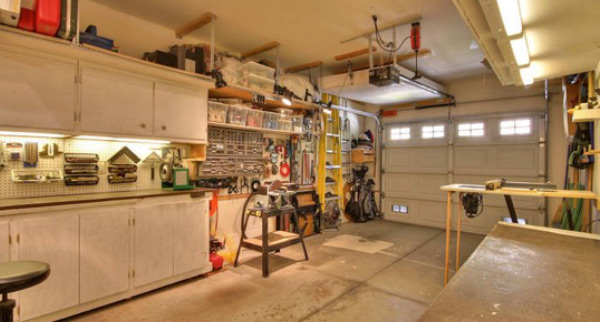
Easy Steps to Make your Garage a Workstation Worthy of Your Inner Artisan
The garage is an often cramped and dusty mess, filled with last year's Christmas decorations and random boxes labeled, "1989." With the maker movement in full swing, folks everywhere are channeling their inner craftsman and trying their hands at 'making' instead of buying. However, we can all agree the living room is likely not the best place to sand, drill or tinker with electronics.
That leaves us with the one location that's technically indoors, but also agreeably outdoorsy enough to be considered a great place for a workshop, the garage. While your garage is likely not in a state to be worked in currently, with a few easy improvements and some gear ideal for building, crafting and fixing, you'll be a genuine 'maker' in no time. Following is a list of key steps to make the transformation in as little time as a weekend:
1. Prepping
The first and possibly most obvious step is cleaning:
- Get a dumpster, if you need one.
- Throw everything out – with your significant other's approval – that you don't need.
- Sweep, dust and check for insects that enjoy dark corners.
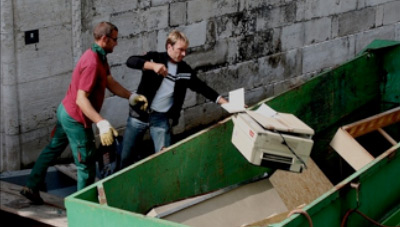
2. Lighting
Perhaps the most important feature of a well-put-together workshop is proper lighting:
- Consider installing 4 foot long tube lights. Traditional fluorescent tube lighting works well, but super energy-efficient LED tube lights are now available to plug and play in existing fixtures. These LED tubes are the latest in lighting technology and will actually save you money via energy savings.
- If you have existing T12 fixtures in your workspace, which can be common in older garages, consider retrofitting them with LED lamps, this will provide more light while saving you money. Consult your local Batteries Plus Bulbs on getting these older units updated with contemporary LED options.
- Also be sure to ask for lamps with a Color Rendering Index (CRI) of 85 or above. Again, your local Batteries Plus Bulbs will be able to help you decipher which CRI is proper for your desired projects.
- Place the fixture evenly across your ceiling to ensure maximum coverage and be sure to include a fixture relatively close to your workstation as to properly illuminate your projects.
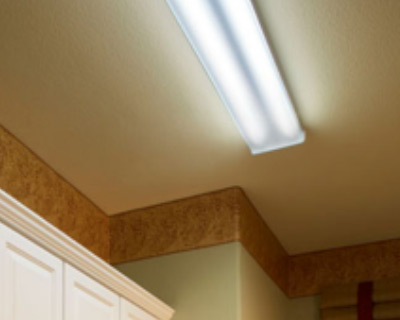
3. Workspace
Having a clean area to work in is imperative when designing your workshop:
- Consider a large working table or bench and ensure its surface is well-maintained.
- Install shelving units or consider purchasing a tool chest.
- Place your workspace close to wall outlets; this will help de-clutter cords and keep your floor space free of wires and cables.
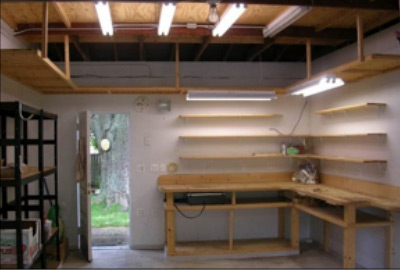
4. Essentials
While there are literally thousands of tools available for hundreds of different types of activities, the following are a few key essentials to ensure you can get off to a solid start:
- A Swivel Vise with Anvil for securing objects.
- Cordless drills, saws, marking tools, hand tools, fasteners, glue, measuring tools, extension cords, knives and sharpeners, gloves, wrenches and ratchets.
- Flashlights and portable work lights are also essential to find and illuminate areas of focus. Consider an LED headlamp, an industrial duty flashlight, or a high power tactical light to illuminate those nooks and crannies. Check our our full selection of flashlights online.
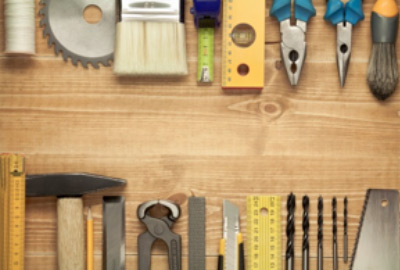
5. Portable Electronics
It's also important to consider the many battery options you'll likely need to keep all of your portable electronics juiced and ready to go:
- Packs of Alkaline AA, AAA, C, and D batteries are great to have around to keep miscellaneous items powered and ready to go.
- If you have a bunch of batteries lying around, consider purchasing a battery tester; this will save you money by not buying unnecessary batteries.
- Maintain your cordless tool batteries. A common failure for rechargeable battery packs occurs when the battery is not routinely used and recharged.

6. Emergencies
Ensuring you have the proper emergency equipment is crucial:
- Consider purchasing a comprehensive first aid kit, stocked with plenty of sterile pads, gauze and tape for emergency situations.
- Include a fire extinguisher and fire blanket in garage spaces to keep small fires from turning into home-destroying blazes.
- Store burn and chemical burn ointments and remedies in a safe place in case of accidents.
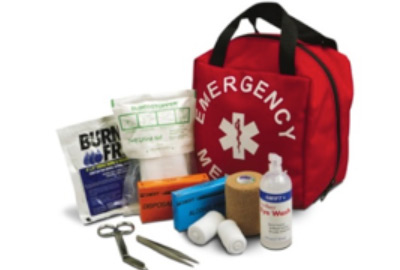
If you're looking for additional tips and advice on lighting and powering up the workshop of your dreams, head to your local Batteries Plus Bulbs to consult the experts. Not sure where the closest store location is? Find out at batteriesplus.com/store-locator.

